Information about Biodiesel

Biodiesel is a fuel that is produced from plant-based oils, and suitable for use in diesel engines only. Biodiesel is a renewable fuel because it is made from a renewable source like plants. Petroleum is a non-renewable fuel because it is made from a fossil source, a substance that is limited.
Biodiesel is produced from vegetable or fatty oils. These oils can be obtained from waste vegetable oil, like used cooking oils and restaurant grease. But it can also be made from raw virgin oils pressed from plants like soybeans, canola seeds, sunflower seeds, cotton seeds, safflower, jatropha, flax seed, palm oil, hemp seeds, and even algae. Rendered animal fats such as lard, tallow, and fish oil can also make biodiesel.
Some people confuse Biodiesel with Vegetable Oil. The difference is that biodiesel fuel goes through a bio-chemical process called transesterification. At the end of this process, the oil is converted into a fuel that is comparable to petroleum diesel fuel in terms of engine running and maintenance (but with environmental benefits). It is no longer vegetable oil after this process. If an engine is running on vegetable oil alone, then the engine most likely was converted to handle the non-converted oil. With biodiesel the fuel is converted, so you don’t have to convert your engine.
Biodiesel is a cleaner-burning, safer alternative to petroleum diesel. It is as biodegradable as sugar, less toxic than salt, and less flammable than petroleum diesel. It is a fuel suitable for all diesel engines without modification, and has been registered with the U.S. Environmental Protection Agency as a fuel and as a fuel additive as long as it meets government ASTM standards.


Biodiesel can be used in percentages. B100 refers to 100% biodiesel (also known as B99.9) or it can be blended with petroleum diesel in any percentage. The most popular blend of biodiesel on the market is B20. This means it is 20% biodiesel, and 80% petroleum diesel.

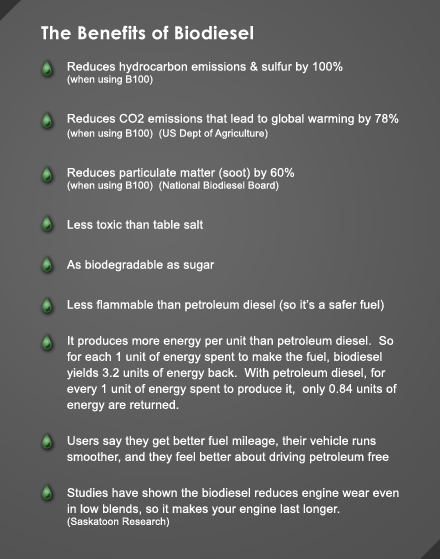
Biodiesel is simple to use and requires no costly engine conversions or infrastructure changes to the current delivery system of diesel fuel. Just pull into a fuel station, and fill up your diesel car or truck with biodiesel today.
About 40% of those service petroleum diesel fuel, and less than 1% service biodiesel. However, the increase in demand will increase the fuel supply.
Biodiesel is not as readily available as petroleum fuels. There are over 180,000 fueling stations nationwide. About 40% of those service petroleum diesel fuel, and less than 1% service biodiesel. But the increase in demand will fuel the supply.
Biodiesel cleans your injectors and fuel lines in the engine. In older diesel engines, they do such a good job cleaning the gunk out that it builds up in the fuel filters. So you might have to get the fuel filter replaced. The older diesels might need to upgrade to newer fuel lines.
Biodiesel has a higher gel point than petroleum diesel, meaning it gets slushy when the weather turns cold. If you are using B100 in 32 degree weather, you would need to switch to a lower blend like B20.
The one emission that goes up by 15% with biodiesel (while all the other emissions go down) is the level of NOx emissions, or nitrogen oxide, which causes smog.
The only truly emission free mode of transportation is either by walking or riding a bicycle. So use your feet whenever you can.
It is important to use biodiesel that was created in a sustainable way, meaning it was produced locally in America and not from palm oil imported from Indonesia for example. If you want to live green, it is important to be conscious of where your fuel and other products come from. The idea behind community based biodiesel is that we us locally grown and produced biodiesel. Ultimately this benefits the economy of the local community and our national security, since we can reduce our dependence on foreign oil. |
 |
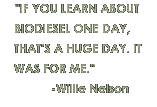
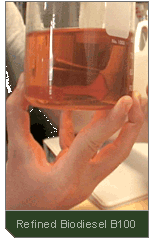

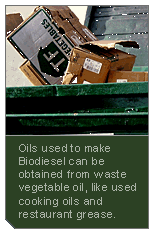

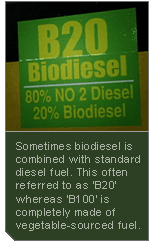




|

